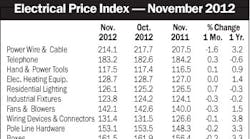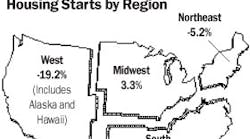Seven of the largest electrical distributors in North America met with reps and manufacturers at the 32nd Annual NEMRA Conference to discuss their strategies for maximizing rep relations, regional warehousing, point-of-sale (POS) reporting and future growth.
Senior executives from Crescent Electric Supply Co. Inc., East Dubuque, Ill.; Graybar Electric Co. Inc., St. Louis; GE Supply Co., Shelton, Conn.; Hagemeyer North America, Atlanta; Rexel Inc., Dallas; Sonepar USA, Berwyn, Pa.; and WESCO International, Pittsburgh, each gave two 50-minute presentations as part of NEMRA's Manufacturers' Group (NMG) annual NMG Forum at the NEMRA Annual, March 6-10 in Dallas.
Although the initial intent of the sessions titled “National Distributor Purchasing Decisions” was for distributors to focus on their POS reporting and regional warehousing, the distributors spent more time on company profiles, growth plans and outlining their philosophies on rep relations.
However, several attendees said it was a “good first step” for the distributors to attend NEMRA and to discuss these topics with reps and manufacturers.
“The presentations were positive for a number of reasons,” said Rick Angel, senior vice president of electrical distribution for Lutron Electronics, Coopersburg, Pa. “The seven distributors all sent their ‘A’ people — those who are involved with POS reporting on a daily basis. They also all acknowledged that the questions and problems associated with POS are clearly on their radar screens and will remain there until they are solved. Everyone agrees there's no effort afoot here to purposely not compensate reps for their efforts. Manufacturers and distributors want reps properly and accurately compensated for their efforts in a timely manner.” Angel said to solve problems in the POS reporting process, manufacturers, distributors and reps most work together.
Larry Fisher, electrical division manager of Erico Inc., Solon, Ohio, agreed with Angel's assessment. “Not only is POS reporting a problem that must be solved, it is one that will be solved,” he said.
Fisher said Erico has addressed the problem by sending all the pertinent data to a clearinghouse run by a marketing company. That clearinghouse then sends Erico the information needed to ensure that reps are “properly and accurately compensated.”
Here are some highlights of the distributors' individual presentations:
-
Joel Bateman, Hagemeyer's executive vice president of marketing and global business development, discussed the company's Product Review Committee. Senior managers in sales, purchasing/procurement and marketing review all new products that manufacturers want Hagemeyer to stock. They are primarily interested in the product's strategic fit and profit potential. Hagemeyer does not use central distribution centers, but plans to phase them in beginning in 2003.
-
In contrast, Jay Bricker, Sonepar's senior vice president, said his company currently operates several regional distribution centers (RDCs) on the East Coast, including Cooper Electric Supply's 100,000-square-foot facility in Linden, N.J, and a 178,000-square-foot warehouse operated by Northeast/Eagle Electric in the Boston metropolitan area.
Specifically addressing the question of POS reporting, Bricker said, “We believe in POS reporting. But there's a problem in gathering that information in each market, depending upon who generated the sale. We want reps to be properly paid, but the industry is faced with a dilemma in that there is no standard. My message today is for all of us to knock on all the necessary doors to get that standard established.”
-
Rexel operates what it calls “DC Lites” in Orlando, Houston, Dallas, Cleveland and St. Louis, but plans to improve the process in RDCs and continue the development of that concept, said Tim Copeland, the company's vice president of operations and logistics. Later this year, the company plans to convert locations in Atlanta and Tampa to hub and spokes and possibly convert a facility in Southern California in 2003.
-
GE Supply has operated RDCs for several years, and the company has five hubs in Boston, New York, Chicago, Los Angeles and San Francisco. “These hubs provide us with a breadth and depth of inventory, high technology, more efficient warehouse operations and consolidated shipping destinations for our manufacturers,” said Scott Telesz, general manager of supply chain management for GE Supply.
Telesz said POS reporting “is one of the most important things we do. Our goal is to accurately have this information delivered to the manufacturer so they can give you (reps) the credit for the sale,” he said. “We've redesigned our process and it works well. The manufacturers have the data and if there are any problems, contact us.”
-
Pat Swed, vice president of WESCO's industrial construction group, focused on the attributes that he values in manufacturers' representatives. “Reps must plan with their manufacturers and with the local distributor branches. They should work to support preferred lines and not push non-approved lines. They should know the market well, understand our strengths and always keep us up-to-date on new products and policy changes. It always bothers me when I see a manufacturer and he tells me about a new product. That's something the rep should be doing.”
-
In response to a question on the distributor's ability to collect data, Marty Burbridge, executive vice president and general manager for Crescent Electric Supply, said, “We measure everything. Our branches can evaluate anything — by manufacturer or product class. Anything you want to know, we can tell you.”
-
Larry Giglio, vice president of operations for Graybar Electric, offered a ringing endorsement for reps as a channel to market. “Reps are a vital and critical link for us in the marketplace,” he said. “For us to be successful, we must be successful with reps. We support POS. Manufacturers must demand that the distributor provide the data. If we don't do that, then we cannot address the customers' needs. At the same time, the distributor must demand that the manufacturer pay based on that POS information and that they provide accurate information to the rep organization. When that is done properly, then we're working on meeting the needs of the ultimate customer.”

